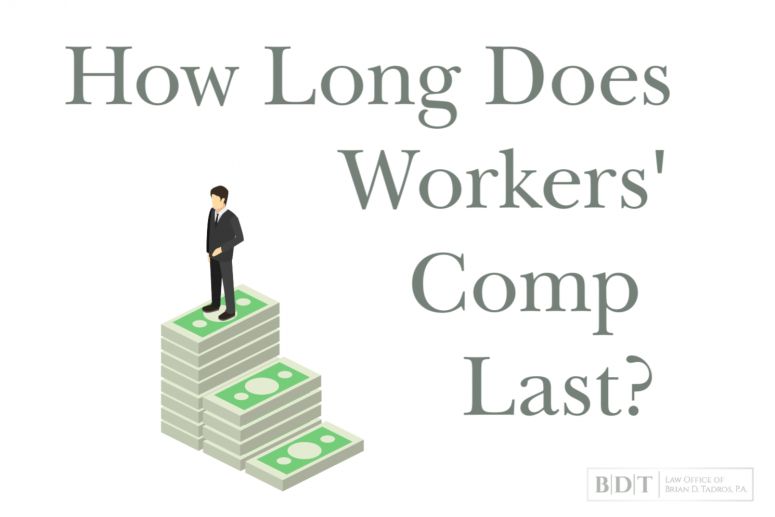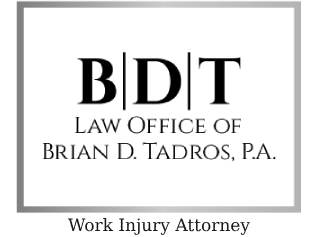
Many employees rely on workers comp to provide them with assistance in the event they are injured at work. While some injuries are relatively simple with no long-term side effects, others take years to recover from (if at all).
So how can you be sure that you will receive workers compensation benefits long enough to fully recover from your injuries? How long does workers comp last in Florida?
At The Law Office of Brian D. Tadros, it’s important to us that all injured workers are given accurate information regarding their workers compensation claim so they can make educated decisions.
Injured at Work In Florida?
Who Is Eligible For Workers Comp Florida?
In order to collect workers compensation in Florida, you must first be eligible for it.
If your employer pays for workers compensation insurance and you are considered an employee (rather than an intern or volunteer), the first requirement is that your job duties were the primary cause of your injury or illness. However, not all work-related accidents are covered by workers comp.
Under Florida law, those injured on the job are not paid for the first seven days that they miss work. There is an exception to this, however. You may receive compensation for those seven days if you lose more than 21 days of work.
How Long Does Workers Comp Last?
Workers comp was designed to give injured workers the assistance they need to recover from an injury or illness. But your workers comp benefits will not last forever.
There are a few things that can cause you to stop receiving your workers comp benefits.
The first situation that would bring your workers comp checks to an end is a complete recovery. Once you have fully recovered and a doctor has approved you returning to work, you will no longer receive (or need) workers comp income benefits.
However, you may also reach Maximum Medical Improvement (MMI), which is the maximum level of recovery that can be expected of you following your accident or illness.
When MMI is reached, the question is: do you require permanent work restrictions and, if so, what permanent work restrictions do you have? If you are assigned permanent work restrictions, rather than returning “back to normal,” you are left with some level of permanent impairment (more on this later). If you have a temporary partial disability (TPD), your doctor may clear you for work duties but in a different capacity.
A claim denial is perhaps the most obvious situation that would result in your payments ending. And just because you have already started to receive weekly benefits checks does not mean that your workers comp case cannot be denied later. Information may come to the attention of your employer or insurance company that would cause them to deny your claim.
But what if none of these situations apply?
In Florida, injured workers with a temporary total disability (TTD) who cannot return to work will not be able to collect workers comp payments past 260 weeks. (Previously, the maximum time for collecting workers comp was 104 weeks, but the Florida Supreme Court ruled this as unconstitutional in 2016.) After such time has passed, you are no longer legally entitled to receive workers compensation benefits.
What If That’s Not Enough?
Not every injured worker is lucky enough to experience a complete and total recovery. But what if 260 weeks’ worth of temporary benefit payments is not enough to cover you long-term?
Workers comp benefits are meant to cover your lost wages during your recovery period. But if your injury has left you with a permanent disability, it may be difficult to find employment or to secure permanent disability benefits.
Further payments will be based on your Permanent Impairment Rating (PIR), which is a number that represents the percentage of your body that is permanently injured.
If you have a permanent partial disability, you will get paid Impairment Income Benefits (IIBs) for a specific number of weeks and at a specific rate, depending on what PIR was assigned by your doctor and what your Compensation Rate (CR) is.
If you have a permanent total disability, you may be entitled to Permanent Total Disability (PTD) payments. PTD benefits are equal to 66 2/3% of your Average Weekly Wage and last until you reach age 75.
It’s worth noting that it is very uncommon for a worker to qualify for PTD. If the insurance company can establish that you are physically capable of performing at least sedentary work within a 50-mile radius of your home, they can avoid payment of this classification of benefits. Additionally, if you are unable to work in any capacity because of being permanently and totally disabled, you will likely qualify to collect federal disability benefits, or social security.
In most serious injury cases, the insurance company will offer you a lump sum settlement. While it is often tempting to accept such a large amount of money, you should NEVER do so without first consulting a qualified and experienced workers comp attorney!
It isn’t always easy to predict the lifetime effects of your injury; it is easy to accept an amount that isn’t enough to cover your long-term costs.

How Long Do Medical Benefits Last?
The time limits and restrictions listed above only apply to lost wages. Medical benefits through workers comp do not expire, provided you receive “authorized medical care” or another benefit paid for by the insurance company once every 12 months.
It isn’t always easy to predict how your body will cope with your injury or illness over time. If you don’t follow up with your authorized treating physician because you think your torn meniscus has completely healed, you might miss out on complications that arise years later. (You would also miss out on the ability to apply for additional benefits, since you didn’t attend yearly visits.)
Even after your MMI is established, you should follow up regularly with your authorized treating physician to discuss any questions/concerns you have, obtain refills on medication, and monitor your condition. Regular medical care from your authorized treating physicians will help keep your condition in check and will also permit you to receive medical benefits on an ongoing basis.
Seeing an authorized doctor at least once every year, regardless of how you feel, can give you valuable information on the state of your health and make the insurance company aware of any changes.
Keep in mind that you are only entitled to continued medical treatment if your work-related accident is greater than 50% the cause of your need for further evaluation and treatment. Thus, if you have been involved in a new accident or there is another cause that is greater than 50% the cause of your need for further evaluation/treatment, you can expect the insurance company to deny continued medical benefits even if you have continued to see your doctors at least once a year.
We Know Workers Comp Florida
Your job isn’t just something to keep you occupied all day, it’s your livelihood. If you are seriously injured as a result of that job, you are entitled to receive benefits to replace your lost wages while you recover.
If your claim has been denied, or if your much-needed benefits are about to dry up, you should retain the services of a workers comp lawyer as soon as possible. A workers comp attorney will not only be able to offer valuable guidance and advice on your case, they can tell you what to expect from the insurance company.
At the Law Office of Brian D. Tadros, we practice workers compensation law and only workers compensation law. From your first consultation, we’ll keep you up-to-date on all the details of your case to ensure that you don’t miss out on valuable benefits. Schedule a free consultation today to see how we can help you.
Updated: This article was originally published in January 2020 and was updated.



